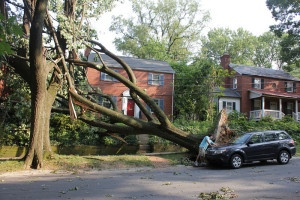
The most substantial long-term solution for combating climate change is to power our homes and businesses with renewable energy—namely wind and solar. However, right now, there is a serious threat to the American wind industry and the estimated 75,000 jobs it has created.
A set of tax credits called the Production Tax Credit (PTC) and the Investment Tax Credit (ITC) will expire at the end of this year if Congress does not act to renew them. These two financial incentives are crucial to the success of this industry. We have already begun to see a slowdown in wind growth across the country, including here in Virginia, due to the uncertainty of their renewal.
The PTC provides a 2.2 cents per kilowatt-hour income tax credit to developers of utility-scale wind projects for the first 10 years while the ITC allows developers to take an upfront credit for construction costs equal to 30% (a developer cannot take both credits).
Future of Wind Energy Uncertain
In Virginia, a land-based project on Poor Mountain near Roanoke and an offshore wind turbine test site at the mouth of the Chesapeake Bay have both been called off, with developers citing financial uncertainty as a main reason.
Right now, we are waiting for the federal government to announce a Lease Sale Notice for developers to install wind turbines in an area 23 miles off Virginia’s coastline. Covering 133 nautical square miles, the lease area could produce 2,000 MW of clean energy. Eight companies have expressed interest in developing projects in that area. However, if the incentives get pulled off the table now, those projects will never come to fruition, meaning the thousands of jobs that could be created right here in Virginia will never materialize. Meanwhile, the climate change-inducing oil and gas industry continues to reap $4 billion in annual tax benefits without any concern of future expiration.
Severe Weather Threatening Virginia
And Virginia has seen its fair share of impacts from climate change. Hampton Roads, second only to New Orleans in terms of vulnerability to sea level rise in the US, is seeing more frequent storm surges and higher tides than ever before. Insurance companies are refusing to insure properties within two miles of the coastline.

We cannot afford to continue down this destructive path. Congress must renew the PTC and ITC during the lame duck session, to not only bolster the wind industry, but to ultimately reduce carbon emissions that are causing the greatest environmental threat to our planet.
Take Action! Contact Your Senators Today
As an NWF affiliate in Virginia, the Virginia Conservation Network is working with the Clean Air Defense Coalition to hold our Virginia congressional leaders accountable on the PTC/ITC extension. We urge you to contact Senators Webb and Warner today to urge them to support this important amendment during the lame duck session.

Chelsea Harnish is the Energy Program Manager for Virginia Conservation Network (VCN). Before joining VCN, Chelsea was the Policy Coordinator for one of our member organizations, the Chesapeake Climate Action Network. Chelsea and her husband Chris moved to Richmond from Cape Cod, Massachusetts where she spent 4 years advocating for Cape Wind, America’s first proposed offshore wind farm. She holds a bachelors degree from the University of South Carolina and a masters degree in marine science from Boston University.
 Offshore Wind Energy
Offshore Wind Energy 

